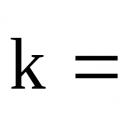What is Humanity? Meaning and interpretation of the word chelovechnost, definition of the term. Miscellaneous What is humanity
Humanity is a friendly attitude towards others, the ability to understand and feel another person. The concept of humanity also implies a willingness to provide help to every person who needs it. This is love and forgiveness. Humanity is an invaluable quality that makes a person worthy of respect.
Helping an elderly person cross the road, feeding a stray animal, calling an ambulance for a person who became ill on the street - all this is a manifestation of humanity. Unfortunately, many people are now indifferent to the grief of others, seeing someone who needs help, they simply pass by, deciding that someone else will help him. I believe that if you want to change the world, then you need to start with yourself, thereby setting an example for others.
Human people are endowed with a rare gift - to see only the brightest and most beautiful in people, distracting from the worst. They have no internal constraint, they are free from everything evil and negative, and peace reigns in their souls. Humanity gives hope for a decent future and helps to find peace.
Being humane is not so easy. In some professions, humanity and philanthropy come to the fore - these are doctors, rescuers and teachers. Humanity plays a big role in family and interpersonal relationships. Parental care, love between spouses, strong friendships - all this is also a manifestation of humanity.
Each of us has this outstanding quality; it is very important to constantly develop it in ourselves. It is necessary to show sensitivity, attentiveness and responsiveness towards other people. Man is not just a biological species, it is a high title that still needs to be earned.
Along with the article “Essay on the topic “Humanity”” read:
Share:1. A noble attitude towards any life.
2. The embodiment everywhere of the five virtues: respectfulness, generosity, truthfulness, intelligence and kindness.
3. Willingness to come to the aid of everyone who needs it, without regard to his merits, capabilities and social status.
4. Willingness to forgive mistakes and rash actions of others, and refusal to judge.
5. Humanity, human attitude to others.
6. Friendly attitude towards people and the world.
7. Moral quality that expresses the principle of humanism in relation to everyday relationships between people.
8. The totality of such personality traits like decency, responsibility, love and caring.
9. The ability to notice positive character traits and personality of each person.
10. The ability to feel another person, his spiritual world, his interests and hopes.
Explanations:
Humanity is the highest virtue, the highest dignity of man. Without it, a person is only an animal. Humanity is one of the best moral qualities of a person, making him worthy of all respect. Humanity is a meaningful feeling; it is developed and strengthened only by education.
Humanity is based on love, kindness and intelligence, which makes it possible to feel other people, understand their interests and needs.
Humanity includes a number of private qualities - benevolence, respect for people, sympathy and trust in them, generosity, self-sacrifice for the interests of others, and also implies modesty, honesty, and sincerity.
Humanity develops along with a growing interest in life and the people around us. An elementary desire for mutual assistance, a caring attitude towards the problems and misfortunes of others, as well as any charity can help with this.
Indifference, callousness - speak of a lack of Humanity.
All-forgiveness is excessive Humanity, often leading to permissiveness (on the other hand).
Humanity helps to be distracted from the worst, to gain freedom from negative emotions (worries about the imperfections of others), gives the opportunity to notice the best, helps to gain faith in other people, in the best principles of each person.
Humanity serves as a source of strength and will to do good deeds and transform the world around us for the better, giving hope for a worthy future not only for ourselves, but also for those around us.
Manifestations of Humanity in everyday life:
- There are professions (doctors, teachers, rescuers, etc.) in which Humanity comes first among the necessary personal qualities.
- The love of parents for children and children for parents, love between spouses is one of the manifestations of Humanity.
- Manifestations of indifference. For example, a person will not pass by someone who has fallen on the street, but will try to help him.
- By participating in charity events, helping children, the elderly and those who for some reason need help, a person shows his best qualities, incl. Humanity.
- A person who is sincerely interested in the inner world of the people around him shows Humanity.
This is how Humanity develops.
Humanity is cultivated in people and is capable of manifesting itself in the practical relationships of people, depending on the nature of social relations. In a class antagonistic society, where everyone views the other as a means to achieve private goals, as an object of exploitation, where rivalry and enmity dominate, inhumanity prevails in the relationships between people (at the same time it characterizes the exploitative society as a whole, with its unemployment and poverty, wars and etc.). Humanity appears there only as an individual property of “good” people and is interpreted exclusively in a liberal-philanthropic spirit.
The true moral content of Humanity arises and develops in the process of fighting social injustice and inhumane living conditions.
What is humanity - inner world a person, characterizing the state of the soul, an invisible appearance. Pleasant appearance does not always characterize goodwill towards surrounding circumstances. Decency and responsiveness to the concerns of others in the modern world are becoming a feeling that atrophies with the development of civilization.
Humanity - what is it?
Internal harmony, which gives rise to comfortable relationships between people, as a result of which they receive moral satisfaction, is humanity. This is the spiritual state of an individual, in which he has a set of high human qualities, the main of which is kindness of heart. Characteristic signs humanity that others notice:
- warmth;
- responsiveness;
- pleasant demeanor;
- respect;
- goodwill;
- high level of internal culture,
- pleasant upbringing;
- sympathy;
- patience;
- humanity;
- readiness for free assistance;
- sincerity.
What is humanity - philosophy
In the understanding of philosophers, humane is humane. The Latin term “humanus” became the basis on which the concept of humanism arose - a worldview that recognizes individual freedom, multifaceted development, and a state of happiness. Cicero called humanity the result of education, a degree of education that elevates the human essence.
Show a humane attitude - provide assistance and show the sympathy that an individual needs, without harming one’s own interests. Making another person happy against his will is not humane. The most sincere manifestations of kindness, imposed on a person without his desire, do not belong to humanity. To do a good deed without calling for help means imposing your own will.

What is inhumanity?
Indifference to the problems and circumstances of another person is callousness of the soul, mental apathy. Humanity and inhumanity are two opposite sides. By displaying one of them, a person arouses respect or negative criticism from others. Inhumane behavior can be directed towards other people, animals, nature, it causes suffering. Synonyms characterizing inhumanity:
- cruelty;
- bitterness;
- ruthlessness;
- barbarism;
- vandalism;
- unmercifulness;
- bloodthirstiness;
- gloat;
- lack of culture;
- ill will;
- selfishness;
- dishonesty;
- immorality.
What is humanity needed for?
Kindness and humanity are two similar feelings. By showing them, a person changes the world, shows care and understanding to others - brings harmony, gives them to gain, trains. Humanity is an act of love and mercy to a person in need of help. It gives faith, helps to overcome difficulties, and shows the “true” face of a person in difficult times.
Showing humanity towards people has now become “unfashionable”. Human nature is designed in such a way that only by showing and giving kindness can one find peace of mind. Without basic help to others, a person turns into a soulless robot, performing certain functions, fixated on the well-being of the individual.

What is humanity?
Having the ability to empathize is important for several professions - doctors, rescuers, teachers, educators. The concept of humanity includes actions in which someone received support - material, moral, physical. Someone else’s problem and concern became close, the person shared it and helped solve it in an accessible way. Selflessness of action is the main rule of humanity. The most common acts of goodwill are donating personal funds to charitable purposes, volunteer work, caring for the infirm who find themselves in difficult life situations:
- old men;
- children;
- orphans;
- disabled people;
- homeless people;
- animals.
Ethical standards do not encourage everyone to act humanely - to save life and health, despite the threat to their own life and personal problems. The greatest degree of good nature is showing courage in unpredictable situations, which has become a heroic act. She shows the personality as a highly moral protector and rescuer who infringed on his own interests for the benefit of others.
Development of humanity
Humanity allows you to notice the good without focusing on the negative, and give hope for the future for yourself and your loved ones. Three basic feelings help develop humanism: love, kindness and an intelligent attitude. A caring reaction to a random person’s problem and participation in charity events are signs of spiritual kindness and spiritual balance.

How to turn off humanity?
If you turn off humanity, a number of qualities are lost, and their absence provokes the development of sociopathy. It becomes difficult for a person, motivated by personal interests, to find mutual language with others, to enjoy the pleasant little things in life, which leads to disharmony in mental development. If at first this position is pleasant, then over time it will begin to depress. Anyone can do sincere support and a good deed, but only a few are capable of showing such a desire.
The problem of humanity
Humanity in the modern world is deliberately confused with weakness. The race for values for personal gain dictates strict rules of social behavior. Against such a background, spiritual kindness and generosity stand out in contrasting colors. What is humanity in specific examples - a teacher who works with a child after school without additional pay, a nurse who diligently looks after a seriously ill patient. It’s not difficult to show care to the best of your ability; the worst thing is not to get support when they can help you, but don’t want to.
1) Humanity- - a moral quality that expresses the principle of humanism in relation to everyday relationships between people. It includes a number of more private qualities - benevolence, respect for people, sympathy and trust in them, generosity, self-sacrifice for the interests of others, and also implies modesty, honesty, and sincerity. Ch. is cultivated in people and is capable of manifesting itself in practical relationships between people, depending on the nature of social relations. In a class antagonistic society, where everyone views others as a means to achieve private goals, as an object of exploitation, where rivalry and enmity dominate, inhumanity prevails in the relationships between people (at the same time it characterizes the exploitative society as a whole, with its unemployment and poverty, wars, etc.). Ch. appears there only as an individual property of “good” people and is interpreted exclusively in a liberal-philanthropic spirit. The true moral content of Ch. arises and develops in the process of workers’ struggle against social injustice and inhumane living conditions. For the first time, objective prerequisites for humanity to become an indispensable moral requirement relating to all areas of human life are created only in a socialist society. Here, inhumane acts act as relics of the past and are condemned by public opinion, and malicious manifestations of inhumanity (violence, hooliganism) are also punishable by law.
2) Humanity- - see Humanity.
Humanity
A moral quality that expresses the principle of humanism in relation to everyday relationships between people. It includes a number of more private qualities - benevolence, respect for people, sympathy and trust in them, generosity, self-sacrifice for the interests of others, and also implies modesty, honesty, and sincerity. Ch. is cultivated in people and is capable of manifesting itself in practical relationships between people, depending on the nature of social relations. In a class antagonistic society, where everyone views others as a means to achieve private goals, as an object of exploitation, where rivalry and enmity dominate, inhumanity prevails in the relationships between people (at the same time it characterizes the exploitative society as a whole, with its unemployment and poverty, wars, etc.). Ch. appears there only as an individual property of “good” people and is interpreted exclusively in a liberal-philanthropic spirit. The true moral content of Ch. arises and develops in the process of workers’ struggle against social injustice and inhumane living conditions. For the first time, objective prerequisites for humanity to become an indispensable moral requirement relating to all areas of human life are created only in a socialist society. Here, inhumane acts act as relics of the past and are condemned by public opinion, and malicious manifestations of inhumanity (violence, hooliganism) are also punishable by law.
See Humanity.
You may be interested to know the lexical, literal or figurative meaning of these words:
Man-god is a concept describing the idea of a person or natural man, ...
Man is a special kind of being, a creator historical development, culture, ...
Conceit is a negative moral quality expressed in an arrogant attitude...
Philanthropy - see Humanism. ...
Misanthropy is a principle of behavior and belief that justifies oppression, suppression...
a moral quality that expresses the principle of humanism in relation to everyday relationships between people. It includes a number of more private qualities - benevolence, respect for people, sympathy and trust in them, generosity, self-sacrifice for the interests of others, and also implies modesty, honesty, and sincerity. Ch. is cultivated in people and is capable of manifesting itself in practical relationships between people, depending on the nature of social relations. In a class antagonistic society, where everyone views others as a means to achieve private goals, as an object of exploitation, where rivalry and enmity dominate, inhumanity prevails in the relationships between people (at the same time it characterizes the exploitative society as a whole, with its unemployment and poverty, wars, etc.). Ch. appears there only as an individual property of “good” people and is interpreted exclusively in a liberal-philanthropic spirit. The true moral content of Ch. arises and develops in the process of workers’ struggle against social injustice and inhumane living conditions. For the first time, objective prerequisites for humanity to become an indispensable moral requirement relating to all areas of human life are created only in a socialist society. Here, inhumane acts act as relics of the past and are condemned by public opinion, and malicious manifestations of inhumanity (violence, hooliganism) are also punishable by law.
 Reaction rate constant Guidelines for laboratory work
Reaction rate constant Guidelines for laboratory work Is there life after death?
Is there life after death? Scientists: Earth is a “space prison” for humanity scientists: Earth is a space prison in the universe
Scientists: Earth is a “space prison” for humanity scientists: Earth is a space prison in the universe